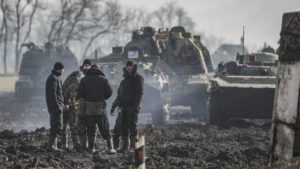 Let’s cut right to the chase here: are we witnessing the prelude to World War 3?
Let’s cut right to the chase here: are we witnessing the prelude to World War 3?
Because let’s face it, that is what a lot of people are understandably asking and thinking in the light of the Kremlin’s recent actions over Ukraine – actions and statements that have triggered a deluge of denouncements and sanctions from the West.
No. As bad as the situation on the Russia-Ukraine border is right now, it does not currently involve a direct military confrontation between Nato and Russia.
In fact, when the US and Britain watched in dismay as Russia built up a force capable of invading Ukraine, they swiftly pulled out their small number of military trainers and advisers.
“That’s a world war when Americans and Russians start shooting at each other,” said US President Joe Biden earlier this month, vowing he would not deploy American troops to Ukraine under any circumstances.
But western leaders still fear Russia could be poised to make a full-scale invasion of Ukraine.
How worried you should be still depends on a number of factors – like who you are, where you are, and what Russia does next.
If you are a frontline Ukrainian soldier in eastern Ukraine then clearly the situation is extremely dangerous. And for millions of Ukrainian people the fears over how the crisis will impact their daily lives is ever present.
Only President Putin and his trusted inner circle know how deep into Ukraine he intends to send his troops.
As long as Russia’s potential invasion force remains massed on the borders then even the bustling Ukrainian capital Kyiv, and other cities, will not be safe from attack.
But the absolute red line for Nato and the West is if Russia threatens a Nato member state.
Under Nato’s Article 5 the entire western military alliance is obliged to come to the defence of any member state that comes under attack.
Ukraine is not a member of Nato, although it has said it wants to join – something President Putin is determined to block.
Eastern European countries like Estonia, Latvia, Lithuania or Poland – once part of Moscow’s orbit in Soviet times – are all now Nato members.
They are feeling distinctly nervous that Russian forces might not stop at Ukraine and instead use some pretext to “come to the aid” of the ethnic Russian minorities in the Baltics and invade.
Hence Nato has recently sent reinforcements to bolster its Eastern European members as a deterrent.
So how worried should you be? As long as there is no direct conflict between Russia and Nato then there is no reason for this crisis, bad as it is, to descend into a full-scale world war.
Let’s not forget that Russia and America have, between them, over 8,000 deployable nuclear warheads so the stakes here are stratospherically high. The old Cold War maxim of “MAD” – Mutually Assured Destruction – still applies.
“Putin,” said a senior British military source on Tuesday, “is not about to attack Nato. He just wants to turn Ukraine into a vassal state like Belarus.”
But the wild card here is the state of Putin’s mind. Often described as coldly calculating, like the chess player and judo fighter that he is, his speech on Monday resembled more that of an angry dictator than a shrewd strategist.
Calling Nato “evil”, he effectively told Ukraine it had no right to exist as a sovereign nation independent from Russia. This is worrying.
Britain is not the only country to be punishing Russia with sanctions – the US has gone further and Germany, for example, has now postponed giving the green light to the massive Nord Stream 2 gas pipeline from Russia – but the UK is in the forefront of pushing for penalties.
Russia will certainly retaliate in some form. Western businesses in Russia will likely suffer but it could go further, much further, if Putin decides.
“Revenge” could take the form of cyber attacks – something the National Cyber Security Centre has already warned about. Often hard to attribute, these could target banks, businesses, individuals and even critical national infrastructure.
The problem now is that after years of declining relations with Moscow, including over the poisoning of Russian dissidents on UK soil, there is almost zero mutual trust remaining between Russia and the West.
And that is a dangerous backdrop against which to have a blazing public row over who is to blame for the ongoing crisis in Ukraine.
